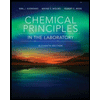The rate constants for the first order decomposition of an organic compound in solution are measured at several temperatures: k (s-¹) 0.00492 0.0216 0.0950 0.326 T (K) 278 288 298 308 Perform linear regression using the given data and fill in the information being asked for. Slope of the line: y-intercept of the line: 1.15 318 r² value of regression: Activation energy of the reaction (with units, rounded off to two decimal places): Arrhenius constant of the reaction (with units, rounded off to two decimal places);
The rate constants for the first order decomposition of an organic compound in solution are measured at several temperatures: k (s-¹) 0.00492 0.0216 0.0950 0.326 T (K) 278 288 298 308 Perform linear regression using the given data and fill in the information being asked for. Slope of the line: y-intercept of the line: 1.15 318 r² value of regression: Activation energy of the reaction (with units, rounded off to two decimal places): Arrhenius constant of the reaction (with units, rounded off to two decimal places);
Chemical Principles in the Laboratory
11th Edition
ISBN:9781305264434
Author:Emil Slowinski, Wayne C. Wolsey, Robert Rossi
Publisher:Emil Slowinski, Wayne C. Wolsey, Robert Rossi
Chapter21: Rates Of Chemical Reactions, Ii. A Clock Reaction
Section: Chapter Questions
Problem 2ASA
Related questions
Question

Transcribed Image Text:The rate constants for the first order decomposition of an organic
compound in solution are measured at several temperatures:
k (s-¹) 0.00492 0.0216 0.0950 0.326 1.15
288 298 308 318
T (K) 278
Perform linear regression using the given data and fill in the
information being asked for.
Slope of the line:
y-intercept of the line:
r² value of regression:
Activation energy of the reaction (with units, rounded off to two
decimal places):
Arrhenius constant of the reaction (with units, rounded off to two
decimal places):
Expert Solution
This question has been solved!
Explore an expertly crafted, step-by-step solution for a thorough understanding of key concepts.
This is a popular solution!
Trending now
This is a popular solution!
Step by step
Solved in 2 steps with 4 images

Knowledge Booster
Learn more about
Need a deep-dive on the concept behind this application? Look no further. Learn more about this topic, chemistry and related others by exploring similar questions and additional content below.Recommended textbooks for you

Chemical Principles in the Laboratory
Chemistry
ISBN:
9781305264434
Author:
Emil Slowinski, Wayne C. Wolsey, Robert Rossi
Publisher:
Brooks Cole

Chemical Principles in the Laboratory
Chemistry
ISBN:
9781305264434
Author:
Emil Slowinski, Wayne C. Wolsey, Robert Rossi
Publisher:
Brooks Cole